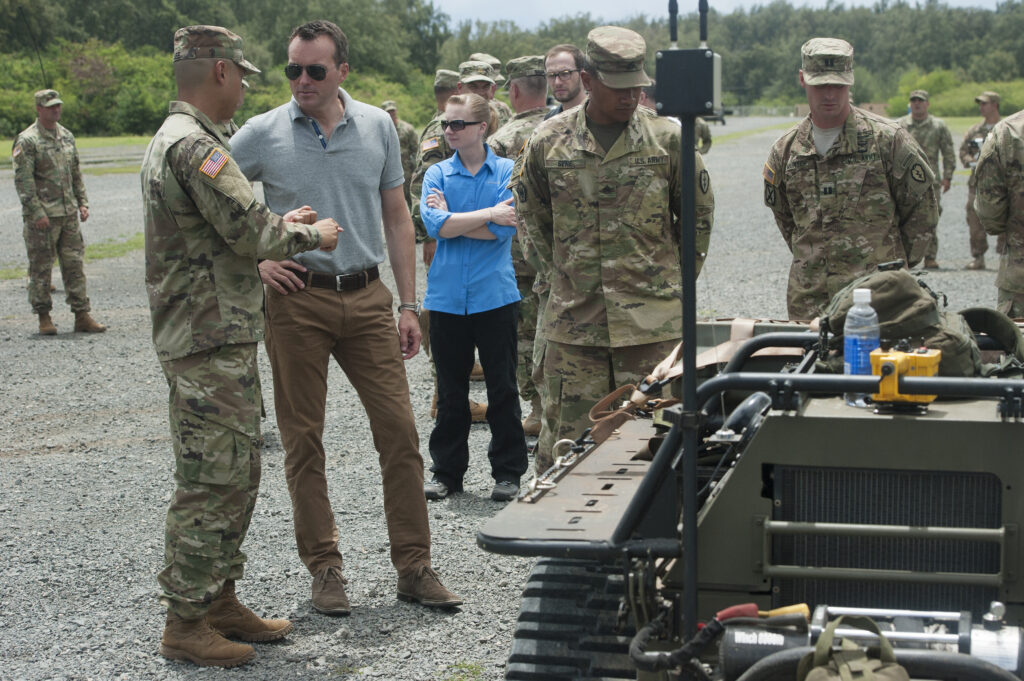Keep Innovation Alive, SecArmy Fanning Implores Trump
Posted on

Army Secretary Eric Fanning checks out a robot at the PACMAN-I exercises in Hawaii.
WASHINGTON: What’s the most important initiative in the Obama Pentagon that the Trump team should pick up and run with? It’s innovation, outgoing Army Secretary Eric Fanning said last night: “Some of the most important work we’ve done in the last eight years is trying to set up places in our procurement system where we can get out things into the field faster.”
Trump has already strafed Pentagon procurement on Twitter, denouncing the new Air Force One and the F-35 Joint Strike Fighter. He’s clearly willing to “drain the swamp.” But that doesn’t mean he’ll want to retain the specific organizations created under Obama to bypass the constipated bureaucracy. The most prominent is outgoing SecDef Ash Carter‘s Defense Innovation Unit (Experimental), but DIUx is hardly alone.

Defense Secretary Ash Carter talks to Strategic Capabilities Office director William Roper at Submarine Base New London.
“(There’s) Will Roper and the Strategic Capabilities Office, the Rapid Capabilities Office that we created in the Army, all of these efforts to try and get capabilities into the hands of warfighters faster,” Fanning said at the Atlantic Monthly‘s Watergate headquarters last night. “I think (that) is what’s most important” to carry over to the next administration.
You can’t route all Pentagon procurement through these new channels, Fanning cautioned: “We are going to need to continue to have these strategic programs that take a long time to build because we are building pretty awesome warfighting platforms” — a reference to things like the F-35 that Trump has criticized. “But we need to figure out how we can iterate faster.”
Where the military once drove technological innovation, Fanning said, today, “in many cases we can’t keep up with the private sector anymore. We probably were one of the last ones to use Blackberries, because Apple said, ‘we don’t want anything to do with you, we give you a device and iterate the software on it, and you are not set up to do that, so it will be useless to you after the first software upgrade.'”
“Now we have Apples, so we’ve figured that out,” Fanning added to laughter. But the wider problem of Pentagon inflexibility remains.

Eric Fanning (in civilian clothes) as Acting Secretary of the Air Force in 2013
Fanning has plenty of experience in both the Clinton and Obama administrations to draw on. While he took the Army job just seven months ago after a painful confirmation battle with Sen. John McCain, he’s worked in the Pentagon throughout the Obama administration, holding seven positions in eight years, from Carter’s staff in the Office of the Secretary of Defense to the Department of the Navy and the Department of the Air Force.
Fanning’s also been the first openly gay man to hold most of these jobs, including his current position — “when I get a new job, the headline takes my name out and put ‘gay man’ in,” he joked — which might make his handoff with Trump administration conservatives particularly awkward. But he sounded almost sanguine that the social changes in the military would endure, such as allowing transsexuals in service and women in combat.
“These things are hard to roll back,” Fanning said. “It doesn’t mean that you can’t. it doesn’t mean you can’t tweak them.”

Then-Lt. Gen. James Mattis in Iraq.
On a personal level, Fanning had only praise for Trump’s chosen candidates for Secretary of Defense, retired Gen. James Mattis, and Secretary of Homeland Security, retired Gen. John Kelly. (He avoided answering questions about the third retired general on Team Trump, the much more controversial Mike Flynn).
“General Kelly is one of the finest Americans you’ll ever meet,” Fanning said. “Gen. Mattis is also very highly regarded.”
“Those of us who were Democrats, who wanted this election to go in a different direction, are coming to terms with it,” Fanning said, “but you can see people already trying to figure out, okay, where’s the right place for me to go to continue to have a voice, because regardless of whether you’re in or out of government, we all have the same end goal in mind…for our country.”
Subscribe to our newsletter
Promotions, new products and sales. Directly to your inbox.
